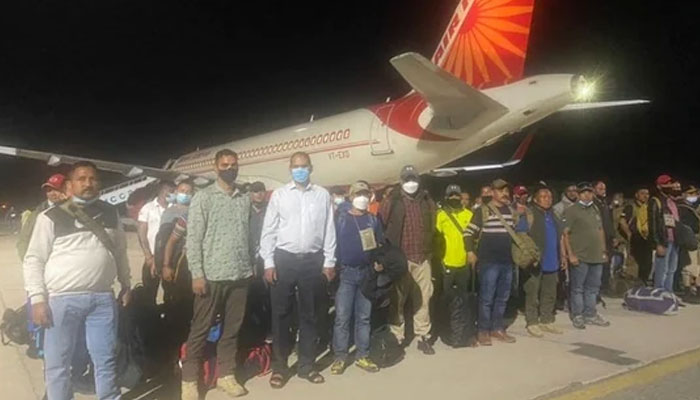India finding extremely difficult to make a return to Afghanistan
ISLAMABAD: India is finding extremely difficult to make a return to Afghanistan since it has throughout been siding with the anti-Taliban forces in that country for more than two decades. Well-placed diplomatic sources told The News on Sunday that a meeting between would-be foreign minister of Taliban Sher Mohammad Abbas Stanekzai and Indian ambassador in Qatar last week turned up as a non-starter. New Delhi is mulling to appoint a special envoy for dealing with Taliban and for the purpose it has approached Iran and Russia to solicit their support for facilitation.
The sources pointed out that India is approaching China for finding areas of commonality and shared interests with Beijing on the Afghan front, despite the increasingly fraught relations that have constituted bilateral interactions over recent years with China. A war-prone and conflict-ridden Afghanistan can undermine China’s ambitious Belt and Road Initiative of which CPEC is the flagship project. China must also reckon with Pakistan’s interests and concerns, with Pakistan clearly having an interest in not being compelled to take in thousands, if not hundreds of thousands of refugees. A major source of GDP growth in Afghanistan over the years has been aid money but Taliban are not interested in any aid from India.
The Indian government is facing severe criticism on the subject of refugees and humanitarian aid in the country as it has been not doing enough on this count. Indian Ministry for External Affairs (MEA) hastily declared that only Hindus and Sikhs were welcome as refugees from Afghanistan. Such a decision was not only poorly made, but equally poorly communicated. External Affairs Minister S Jaishankar now has changed his stance, offering to take in all refugees but the goodwill India had built up over the years amongst the Afghan population has been severely dented. About 140 Indians and members of the Sikh minority still remain in Kabul, and need to be brought back. India has thus far transported 565 people, including 112 Afghan nationals to Delhi. The numbers have been far lower than other countries like the US, which has evacuated 122,000 people, including more than 100,000 Afghan nationals. In some measure, it is due to the fact that the Indian government has security concerns and is strictly regulating any visas, and in some measure as it is unable to ensure the safe evacuation of people wishing to travel.
India is reportedly satisfied that the Taliban leader assured the Indian ambassador that all the issues would be “positively addressed”. Stanekzai, who trained and graduated from the Indian Military Academy at Dehradun, called India to continue its political and trade ties with Afghanistan, and pursue connectivity projects. India has assured Taliban that it will be recalibrating its earlier position on the Taliban as a terrorist group.
India had been expressing concerns about the Haqqani Group, which is a part of the Taliban and Taliban Deputy leader Sirajuddin Haqqani. Indians have been blaming without any evidence that the Haqqani Group was responsible for the attacks on the Indian Embassy in 2008-2009. The attacks had left more than 75 people, including Indian diplomats, dead.
-
 Dwayne Johnson Confesses What Secretly Scares Him More Than Fame
Dwayne Johnson Confesses What Secretly Scares Him More Than Fame -
 Elizabeth Hurley's Son Damian Breaks Silence On Mom’s Romance With Billy Ray Cyrus
Elizabeth Hurley's Son Damian Breaks Silence On Mom’s Romance With Billy Ray Cyrus -
 Shamed Andrew Should Be Happy ‘he Is Only In For Sharing Information’
Shamed Andrew Should Be Happy ‘he Is Only In For Sharing Information’ -
 Daniel Radcliffe Wants Son To See Him As Just Dad, Not Harry Potter
Daniel Radcliffe Wants Son To See Him As Just Dad, Not Harry Potter -
 Apple Sued Over 'child Sexual Abuse' Material Stored Or Shared On ICloud
Apple Sued Over 'child Sexual Abuse' Material Stored Or Shared On ICloud -
 Nancy Guthrie Kidnapped With 'blessings' Of Drug Cartels
Nancy Guthrie Kidnapped With 'blessings' Of Drug Cartels -
 Hailey Bieber Reveals Justin Bieber's Hit Song Baby Jack Is Already Singing
Hailey Bieber Reveals Justin Bieber's Hit Song Baby Jack Is Already Singing -
 Emily Ratajkowski Appears To Confirm Romance With Dua Lipa's Ex Romain Gavras
Emily Ratajkowski Appears To Confirm Romance With Dua Lipa's Ex Romain Gavras -
 Leighton Meester Breaks Silence On Viral Ariana Grande Interaction On Critics Choice Awards
Leighton Meester Breaks Silence On Viral Ariana Grande Interaction On Critics Choice Awards -
 Heavy Snowfall Disrupts Operations At Germany's Largest Airport
Heavy Snowfall Disrupts Operations At Germany's Largest Airport -
 Andrew Mountbatten Windsor Released Hours After Police Arrest
Andrew Mountbatten Windsor Released Hours After Police Arrest -
 Heidi Klum Eyes Spooky Season Anthem With Diplo After Being Dubbed 'Queen Of Halloween'
Heidi Klum Eyes Spooky Season Anthem With Diplo After Being Dubbed 'Queen Of Halloween' -
 King Charles Is In ‘unchartered Waters’ As Andrew Takes Family Down
King Charles Is In ‘unchartered Waters’ As Andrew Takes Family Down -
 Why Prince Harry, Meghan 'immensely' Feel 'relieved' Amid Andrew's Arrest?
Why Prince Harry, Meghan 'immensely' Feel 'relieved' Amid Andrew's Arrest? -
 Jennifer Aniston’s Boyfriend Jim Curtis Hints At Tensions At Home, Reveals Rules To Survive Fights
Jennifer Aniston’s Boyfriend Jim Curtis Hints At Tensions At Home, Reveals Rules To Survive Fights -
 Shamed Andrew ‘dismissive’ Act Towards Royal Butler Exposed
Shamed Andrew ‘dismissive’ Act Towards Royal Butler Exposed




